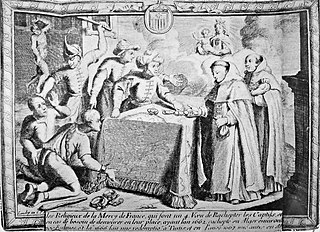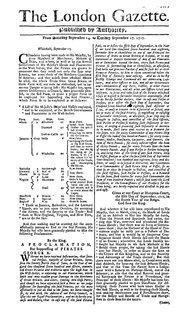The Proclamation for Suppressing of Pirates may refer to:
- Either of the 1717–1718 Acts of Grace
- Other acts of grace (piracy)
The Proclamation for Suppressing of Pirates may refer to:

In 1798, President John Adams signed the Alien and Sedition Acts, which were passed by the Federalist-dominated 5th United States Congress. They made it harder for an immigrant to become a citizen, allowed the president to imprison and deport non-citizens who were known as dangerous or who were from a hostile nation, and criminalized making 'false statements' critical of the federal government. The "Alien Friends Act" expired two years after its passage, and the "Sedition Act" expired on 3 March 1801, while the "Naturalization Act" and "Alien Enemies Act" had no expiration clause.

Edward Teach, better known as Blackbeard, was an English pirate who operated around the West Indies and the eastern coast of Britain's North American colonies. Little is known about his early life, but he may have been a sailor on privateer ships during Queen Anne's War before he settled on the Bahamian island of New Providence, a base for Captain Benjamin Hornigold, whose crew Teach joined around 1716. Hornigold placed him in command of a sloop that he had captured, and the two engaged in numerous acts of piracy. Their numbers were boosted by the addition to their fleet of two more ships, one of which was commanded by Stede Bonnet; but Hornigold retired from piracy toward the end of 1717, taking two vessels with him.

The Emancipation Proclamation, or Proclamation 95, was a presidential proclamation and executive order issued by United States President Abraham Lincoln on September 22, 1862, during the Civil War. The Proclamation read:
That on the first day of January in the year of our Lord, one thousand eight hundred and sixty-three, all persons held as slaves within any State, or designated part of a State, the people whereof shall then be in rebellion against the United States shall be then, thenceforward, and forever free; and the executive government of the United States, including the military and naval authority thereof, will recognize and maintain the freedom of such persons, and will do no act or acts to repress such persons, or any of them, in any efforts they may make for their actual freedom.
Neutrality Act may refer to:

The Riot Act 1714 was an act of the Parliament of Great Britain which authorised local authorities to declare any group of 12 or more people to be unlawfully assembled and to disperse or face punitive action. The act's long title was "An Act for preventing tumults and riotous assemblies, and for the more speedy and effectual punishing the rioters", and it came into force on 1 August 1715. It was repealed in England and Wales by section 10(2) and Part III of Schedule 3 of the Criminal Law Act 1967. Acts similar to the Riot Act passed into the laws of British colonies in Australia, Canada, and America, some of which remain today.
Peter Easton was a pirate in the early 17th century. The 'most famous English pirate of the day', his piracies ranged from Ireland and Guinea to Newfoundland. He is best known today for his involvement in the early English settlement of Newfoundland, including the settlements at Harbour Grace and Ferryland from 1611 to 1614. One of the most successful of all pirates, he controlled such seapower that no sovereign or state could afford to ignore him, and he was never overtaken or captured by any fleet commissioned to hunt him down. However, he is not as well known as some of the pirates from the late 17th and early 18th centuries.
Captain Benjamin Hornigold (1680–1719) was an English pirate who operated during the tail end of the Golden Age of Piracy.

The Proclamation of Rebellion, officially titled A Proclamation for Suppressing Rebellion and Sedition, was the response of George III to the news of the Battle of Bunker Hill at the outset of the American Revolution. Issued on 23 August 1775, it declared elements of the American colonies in a state of "open and avowed rebellion". It ordered officials of the empire "to use their utmost endeavours to withstand and suppress such rebellion". The 1775 proclamation of rebellion also encouraged subjects throughout the empire, including those in Britain, to report anyone carrying on "traitorous correspondence" with the rebels to be punished.

Dominique You or Youx was a privateer, soldier, and politician.
In the English and British tradition, the royal prerogative of mercy is one of the historic royal prerogatives of the British monarch, by which they can grant pardons to convicted persons. The royal prerogative of mercy was originally used to permit the monarch to withdraw, or provide alternatives to death sentences; the alternative of penal transportation to "partes abroade" was used since at least 1617. It is now used to change any sentence or penalty. A royal pardon does not overturn a conviction.

The Confiscation Act of 1861 was an act of Congress during the early months of the American Civil War permitting court proceedings for confiscation of any of property being used to support the Confederate independence effort, including slaves.

The Piracy Act 1721 (c.24) was an Act of the Parliament of Great Britain.

Anglo-Turkish piracy or the Anglo-Barbary piracy refers to the collaboration between Barbary pirates and English pirates against Catholic shipping during the 17th century.

Cromwell's Act of Grace, or more formally the Act of Pardon and Grace to the People of Scotland, was an Act of the Parliament of England that declared that the people of Scotland were pardoned for any crimes they might have committed during the Wars of the Three Kingdoms. It was proclaimed at the Mercat Cross in Edinburgh on 5 May 1654. General George Monck, the English military governor of Scotland, was present in Edinburgh, having arrived the day before for two proclamations also delivered at the Mercat Cross, the first declaring Oliver Cromwell to be the protector of England, Ireland and Scotland, and that Scotland was united with the Commonwealth of England.

The Piracy Act 1850, sometimes called the Pirates Repeal Act, is an Act of the Parliament of the United Kingdom. It relates to proceedings for the condemnation of ships and other things taken from pirates and creates an offence of perjury in such proceedings.

The Republic of Pirates was the base or stronghold of a loose confederacy run by privateers-turned-pirates in Nassau on New Providence island in the Bahamas for about eleven years from 1706 until 1718. While it was not a republic in a formal sense, it was governed by an informal pirate code, which dictated that the crews of the Republic would vote on the leadership of their ships and treat other pirate crews with civility.

Proclamation No. 55 was signed by Philippine President Rodrigo Duterte on September 4, 2016, to officially declare a state of emergency in the Philippines in response to the 2016 Davao City bombing.
International piracy law is international law that is meant to protect against piracy. Throughout history and legal precedents, pirates have been defined as hostis humani generis, the enemy of all mankind. The United Nations has codified much of the law in the United Nations Convention on the Law of the Sea (UNCLOS), which defines different types of piracy and ways to combat it.

The Proclamation for Suppressing of Pirates was issued by George I of Great Britain on 5 September 1717. It promised a royal pardon for acts of piracy committed before the following 5 January to those pirates who surrendered themselves to the correct authority before a deadline. Originally, the surrender had to occur on or before 5 September 1718; this was later extended by a second proclamation to 1 July 1719.

Acts of grace, in the context of piracy, were state proclamations offering pardons for acts of piracy. General pardons for piracy were offered on numerous occasions and by multiple states, for instance by the Kingdom of England and its successor, the Kingdom of Great Britain, in the 17th and 18th centuries.